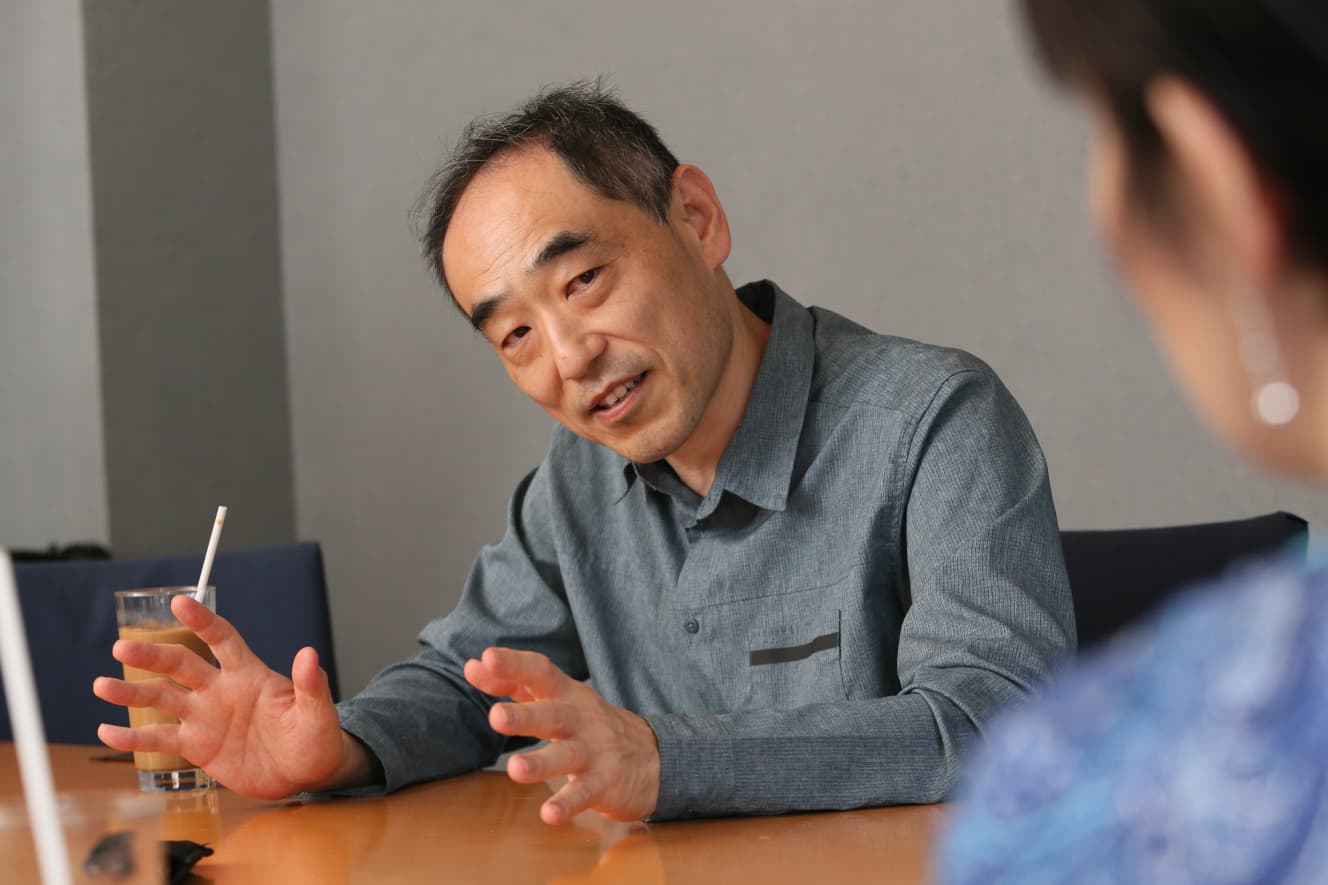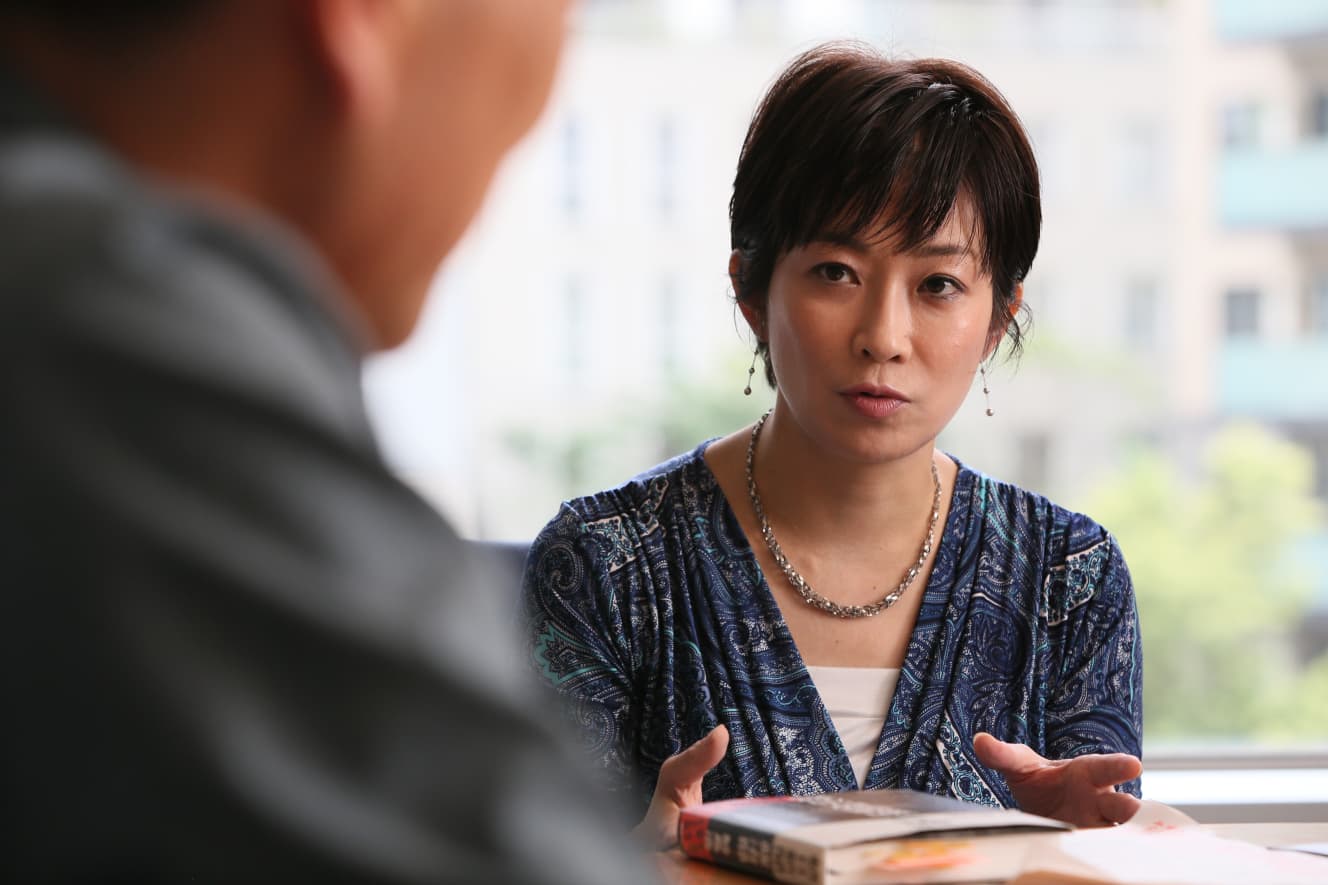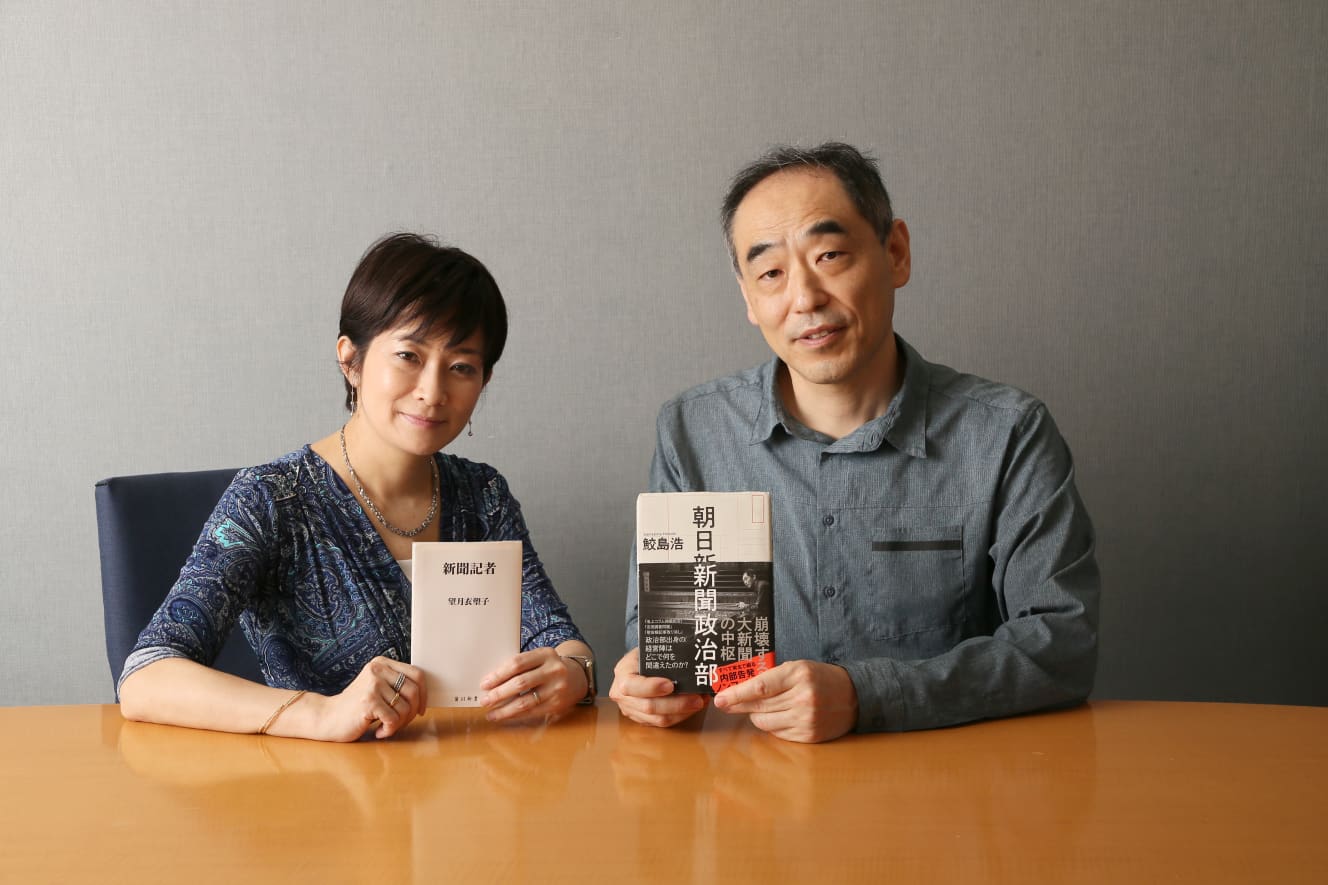Hiroshi Samejima and Kinshoko Mochizuki, In-Depth Discussion ③ The Issues in the Upper House Election and the Future of the Press
We would like to present the third installment of a special dialogue between two high-profile journalists. Hiroshi Samejima, 50, whose recent book ” Asahi Shimbun Seiji-bu” (Kodansha) has sold more than 40,000 copies, and Kinoshiko Mochizuki, 46, a reporter of the Tokyo Shimbun’s Social Affairs Department. The theme of this year’s discussion is the issues in the House of Councillors election, which will be deciphered through their expert analysis.
Samejima: In the first installment of our discussion, I pointed out that the issue in this House of Councillors election is the “abolition of the consumption tax,” which Reiwa’s newly-elected party has been advocating.
Mochizuki: Yes. Mr. Samejima left the major media outlet, the Asahi Shimbun, to become an independent freelance political journalist, but this was a bold declaration that completely ignored neutral reporting during the election period.
Samejima: The Constitutional Democratic Party of Japan (DPJ) has an ambiguous attitude toward the consumption tax, saying that it will be a “temporary tax cut. The consumption tax is necessary to finance social security in the first place, but the economy is in a bad shape at the moment, so the DPJ may be saying that it will cut the consumption tax temporarily. If the LDP has a strong belief in the redistribution of wealth to correct disparities and realize a fair society, it should propose the abolition of the consumption tax, which is a heavy burden on the weak. The Upper House election will be quite tough for the Rikken DPJ, which cannot fully stand on the side of the common people and reeks of elitism.
Mochizuki: On the contrary, if the LDP wins, I think a consumption tax hike is a possibility. The Kishida administration is said to be a puppet of Vice President Taro Aso, who until last year served as Finance Minister for 3205 days, the longest postwar period. In effect, it is a de facto Finance Ministry cabinet.
Constitutional Reform is a Camouflage
Samejima: That’s right. If the LDP wins the Upper House election, there will be no national elections for the next three years unless Prime Minister Kishida dissolves the House of Representatives. In other words, the administration will be stable. There are two themes that may be undertaken using political resources during these three rosy years. One is constitutional reform and the other is consumption tax. However, I do not subscribe to the “possible constitutional revision” argument. Rather, I believe that the current Kishida administration is using the constitutional revision as camouflage to raise taxes. That is why I thought that the House of Councillors election should make the “consumption tax” an issue.
Mochizuki I see. But is there really no constitutional amendment? Even within the LDP, there is a lot of excitement within the LDP, saying, “We will revise the Constitution in the blessed three years after the Upper House election!” I see quite a few people in the LDP who are floating around saying, “We will revise the Constitution in the blessed three years after the Upper House election!
Samejima: The cunning Vice President Aso. That strategy is transparent to me. He is fueling the momentum for constitutional change while geopolitical risks are increasing worldwide due to Russia’s invasion of Ukraine. However, his real intention is to raise taxes. At the same time, bureaucrats at the Ministry of Finance are blowing the whistle that “Kishida will revise the Constitution,” but so be it. They just want to distract attention from the tax hike by agitating for constitutional reform.
Mochizuki Indeed, in a recent discussion of party leaders at the Nihon Keizai Club, Prime Minister Kishida was asked about the possibility of a constitutional amendment if two-thirds of the Diet were in agreement with the constitutional amendment, to which he replied, “What is important is the substance of the amendment, and we need two-thirds of the Diet to agree on it. Therefore, it cannot be done too quickly. Therefore, we can’t do it too quickly.” Kishida was critical of the Ishin’s poor argument. Did he mean that he was being honest?
Samejima I think so. Listening to Mr. Kishida’s and Mr. Aso’s comments, we should conclude that the possibility of a consumption tax hike after the Upper House election is increasing.
Mochizuki Wow, the newspapers should really be writing about this. This kind of analysis should be worth reporting now, during the election campaign, but it is becoming difficult for the existing media. I can’t help but nod in agreement with Mr. Samejima’s assertion that this has stalled political reporting and contributed to distrust of politics.

Samejima: We are in a period of great political change, especially now, when the two-party system is dysfunctional.
Mochizuki It is true that there is a growing sense among voters that the two-party system and the single-seat constituency system are not compatible.
Samejima: I used to support the two-party system, but I have completely changed my mind. In contrast to the LDP, the Rikken Democratic Party of Japan, the leading opposition party, is no longer able to clearly show the difference in its political philosophy. This is exposed by the “consumption tax reduction” and its inability to go as far as “abolition of the consumption tax” like Reiwa’s newly elected party. The two-party politics of similarity and elitism cannot absorb the dissatisfaction of the people.
Mochizuki Speaking of elitism, it is true that Kenta Izumi, the representative of the Constitutional Democratic Party of Japan, is a typical honor student who also served as student body president at his high school, although he has had to work as a secretary and knows the hardships of being a secretary. He was also president of the All-Japan Student Speech Debate Exchange Association when he was a student, and he is well-liked and has a refreshing eloquence. However, when I showed him to my mother’s friends and asked their opinions, they said that Reiwa’s representative, Taro Yamamoto, was more persuasive.
Samejima: If he seems elitist, he won’t resonate with voters. Of course, there are hard-working people in both the LDP and the Rikken, but the bad thing about them is that they think, “I was able to do it, so you should be able to do it, too. The bad thing about them is that they think, “Since I was able to do it, you can do it, too. and they become overbearing. Former Prime Minister Suga Yoshihide has a similar attitude. Because Mr. Kan had to work hard to rise through the ranks of the LDP, which was made up of hereditary Diet members, he became overbearing and ruthless toward those who were not capable of doing so.
Circumstances reverting to a multi-party system
Mochizuki So the elite-dominated two-party system is losing its grip on the hearts and minds of the people.
Samejima That is what I mean. We are now in the midst of a return to a multiparty system, with the rise of populist parties like Reiwa that can make bold promises that break with the conventional wisdom built up by the elites. When I reexamined political reporting in these times, I thought that politics would become much easier to understand if individual reporters and the media made their own “guesses” clear and debated them while carefully explaining the reasons for their “guesses.
Mochizuki And now you have become a “YouTuber,” haven’t you?
Samejima Yes. I not only post articles on “Samejima Times,” but also provide video commentary at the same time. I think that empathy is the most important thing. I am sometimes happy and sometimes angry together with readers and viewers. Therefore, my competitors are neither the Asahi Shimbun nor the Yomiuri Shimbun. It is Atsuhiko Nakata, who became an independent YouTube star from Yoshimoto Kogyo.
Mochizuki His current affairs commentary on his YouTube channel “YouTube University” is easy to understand and now has close to 4.8 million subscribers.
Samejima: I have been a full-fledged YouTube user for three months. I have more than 15,000 subscribers. I am not as far as Atsuhiko Nakata, but I would like to follow in his footsteps. I sympathize with him in the way he points out the light and shadow of the comedy industry, including Yoshimoto Kogyo. Since I also showed the inside of the huge mass media in “The Asahi Shimbun’s Political Department,” I would like to provide undisciplined commentary on YouTube, including the problems of the existing media.
Mochizuki: That is a story that hits home for me, too, as a newspaper reporter. It also means that nowadays, newspaper companies are not the only rivals.

Samejima: In addition to YouTube, there are sports broadcasts, games, and individual social networking sites. So you have to take time out of your LINE time with your friends or girlfriends to have them read your articles. Therefore, as media diversifies, it is necessary to have a unique color. At “SAMEJIMA TIMES,” we have broken away from the false objective reporting and the on-the-ground reporting of other people’s affairs, and are now “Reiwa-supporting.
This is a taboo-breaker even for me, who used to be a political reporter for the Asahi Shimbun. I have received a lot of criticism about whether it is okay for a journalist to be beholden to a particular political party, but at a time when distrust of the mass media’s political coverage has risen to the utmost limit, exploring a new form of political journalism is an urgent task.
Mochizuki: Political reporting is going through a major change, isn’t it?
Samejima Yes, I think the reason why the voter turnout in national elections is still below 50% is because of distrust of politics and distrust of the political press. Because the current news coverage from the sidelines is not interesting at all. I realized this when I started YouTube. I realized through YouTube that even news reporting needs to be entertaining. And the confrontation between Mr. Kan and the Prime Minister’s Club, which you have been continuing, was also entertainment.
Mochizuki: I see, that may be true.
Samejima: Mr. Mochizuki used his rich expressive power to ask Mr. Kan tough questions. Because many people sympathized with that, Mr. Mochizuki became a celebrity.
You have it backwards.”
Mochizuki: Well, it is true that I was allowed to play the role of Annie in a musical when I was a child. And there was the time in the third grade when I went up to the kid general who scared everyone and got beat up by him. I guess it must have been my character to go against something unforgivable.
Samejima I see. Your spirit of fighting and theatrical expression must have supported your question to Mr. Suga. As a YouTuber, I envy your entertainment ability.
Mochizuki No, no, I did not intend it that way, but from the viewpoint of the audience, Mr. Kan must have been my opposite. There are not many people who are as inexpressive as he was, so perhaps it was the opposite, the sense that he was a rascally boss (laughs). I heard that in December 2008, Mr. Kan appeared on Nico Nico Douga while the COVID-19 crisis was spreading rapidly and GoTo was being criticized, and he said a boring gag, “This is Gasu,” and the secretaries in the studio froze. Moreover, at that very moment, a preliminary report on the number of new cases of corona infection came on the air, and the timing was terrible. In a reverse sense, I thought, “He’s got it.
Samejima I am sure that Mr. Kan was jealous of Mr. Mochizuki’s ability to express himself. It was the same for the political reporters. It was the reporters in the political affairs section who, despite being in the social affairs section, got in Mr. Mochizuki’s way and told him to “take down politics,” and they were the ones who got in the ground saying, “He took all the good parts.
Mochizuki: In that sense, perhaps Japanese people need to be educated to improve their ability to express themselves through debate and drama. The level of arts and sciences in American elementary schools is so high that it is astonishing. After all, reporters also need to have a clear idea of what they want to convey and the ability to express it.
Samejima: Mr. Mochizuki has a clear idea of what he wants to convey.
Mochizuki: No matter what kind of administration is in power, I want to stay close to minorities who are left in the margins of the system. Right now, I am particularly concerned about the foreign workers and technical intern trainees who are being left behind due to the COVID-19 crisis.
Samejima I also have a desire to be a voice for those who are left behind. I would like to explain how Reiwa’s newly elected party will fight against the senior citizens who control Nagata-cho and what kind of opposition realignment will occur from there.
Both Mr. Mochizuki and I have liberal beliefs, but other reporters and journalists should also report on politics according to their own beliefs. In this way, I believe that distrust of politics will be eliminated and that political reporting will enliven politics.

Hiroshi Samejima was born in 1971. Joined the Asahi Shimbun after graduating from Kyoto University’s Faculty of Law. After leaving the newspaper in 2009, he launched ” SAMEJIMA TIMES,” which is available for free every day. He also actively provides political commentary videos on YouTube.
Born in 1975 . After graduating from the Faculty of Law at Keio University, he joined the Chunichi Shimbun newspaper in Tokyo. He has worked in the economics and social affairs sections of the newspaper. His sharp questions at the Chief Cabinet Secretary’s press conference became the talk of the town. Author of “Newspaper Reporter” and “Arms Export and Japanese Companies” (both in Kadokawa Shinsho).
Photo by: Shinji Hamasaki
